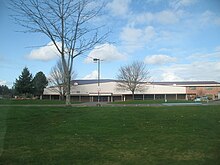Bethel School District v. Fraser
Believing his speech to be inappropriate and vulgar, the school's administration suspended Fraser for three days and barred him from speaking at graduation.
Writing for the majority, Chief Justice Warren Burger found that schools have the right to suppress student speech that is considered lewd or indecent, even if not obscene, in the interest of preserving a safe educational environment.
[1] On April 26, 1983, an assembly was held at Bethel High School in Spanaway, Washington for student council elections to take place.
[2] At the assembly, Matthew Fraser, a 17-year-old senior, gave a speech nominating a classmate for student council vice president.
[7] While the speech was not outwardly obscene, Fraser described Kuhlman "through the use of sexual metaphor and double entendre", which many observers found offensive.
[8] The morning after the assembly, Fraser was called to the office, where the Assistant Principal informed him that his speech violated a school rule against "disruptive conduct", which prohibited the use of "obscene, profane language or gestures".
[14] With approval from his parents and help from American Civil Liberties Union cooperating attorney Jeff Haley, Fraser filed a lawsuit against the school authorities claiming a violation of his First Amendment right to free speech.
United States District Court judge Jack Edward Tanner ruled in his favor.
[16] Though the Court distinguished its 1969 decision Tinker v. Des Moines Independent Community School District, which upheld the right of students to express themselves where their words (or in that case, the wearing of a protest armband) are non-disruptive and could not be seen as connected with the school, Fraser limits the scope of that ruling, by prohibiting certain styles of expression that are sexually vulgar.
